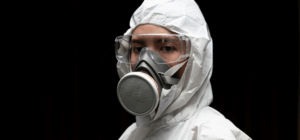Trauma Cleaning Company | Importance of Discretion and Sensitivity
Trauma Cleaning Company | Importance of Discretion and Sensitivity
Summary
The article emphasises the critical importance of discretion and sensitivity for a trauma cleaning company, where professionals handle distressing situations like crime scenes and unattended deaths with technical skill and emotional empathy. Upholding privacy and trust, trauma cleaners undergo extensive training to manage both the physical cleanup and the psychological impact with compassion. Effective communication and ethical practices are key, and the right trauma cleaning company will exhibit professionalism, respect, and a deep understanding of the emotional toll involved in their work.
In the challenging field of trauma cleaning, two elements stand paramount above all: discretion and sensitivity. These are not just mere words; they form the foundation upon which a trauma cleaning company is built. Understanding the critical role these factors play is essential for anyone involved in this unique and demanding profession.
Understanding Trauma Cleaning: A Delicate Task
Trauma cleaning is a service that goes beyond mere cleaning. It involves dealing with situations that are often distressing and traumatic, such as crime scenes, unattended deaths, or accidents. The nature of these situations requires not only technical cleaning skills but also a high level of emotional intelligence and empathy.
Discretion: The Cornerstone of Trust
When dealing with traumatic events, discretion is of the utmost importance. Clients are often going through one of the most challenging times in their lives. Ensuring their privacy is respected is not just a courtesy; it’s an ethical obligation. This means being mindful of how information is handled, who it’s shared with, and how the cleaning process is conducted, often away from the public eye.
The Role of Sensitivity in Trauma Cleaning
Sensitivity is equally crucial within a trauma cleaning company. It’s about understanding and acknowledging the emotional and psychological impact the situation may have on those involved. This includes showing compassion, offering understanding, and being attentive to the needs and feelings of the clients and their families.
Advanced Training: Preparing for Emotional and Psychological Challenges
Trauma cleaning company professionals undergo extensive training, not just in cleaning techniques but also in how to handle emotional and psychological aspects sensitively. This training ensures that cleaners are equipped to offer understanding, in addition to their technical skills.
Techniques and Tools: Ensuring Efficiency and Compassion
The use of advanced cleaning techniques and tools is essential in trauma cleaning. However, these must be employed with a sense of compassion and respect for the circumstances. The goal is to restore the area to a safe and clean state, while also being mindful of the emotional context of the situation.
Communication: A Key Aspect of Trauma Cleaning Services
Effective communication is a critical component of an effective trauma cleaning company. This involves not only communicating with clients in a respectful and compassionate manner but also coordinating with law enforcement and other agencies when necessary. Clear, considerate communication ensures that all parties are informed and that the cleaning process is as smooth and unobtrusive as possible.
Ethical Considerations in Trauma Cleaning
Ethical considerations are at the forefront of a professional trauma cleaning company. This includes respecting the property and belongings of those involved, ensuring that all cleaning methods are in line with health and safety regulations, and maintaining a high level of professionalism at all times.
Choosing the Right Trauma Cleaning Company
When selecting a trauma cleaning company, it’s essential to choose one that embodies these values of discretion and sensitivity. Look for companies that have a strong track record of professionalism, respect, and empathy, in addition to their technical expertise.
In conclusion, trauma cleaning is a service that requires much more than just cleaning skills. It demands a deep understanding of the emotional and psychological impact of traumatic events, a commitment to discretion and sensitivity, and an unwavering dedication to ethical and compassionate service.
FAQs
What Exactly Does Trauma Cleaning Involve?
Trauma cleaning involves the cleaning and restoration of areas that have been contaminated due to traumatic events such as accidents, suicides, homicides, unattended deaths, or other biohazard situations. This process not only includes thorough cleaning and sanitising of the affected areas but also the safe disposal of biohazardous materials.
How is Trauma Cleaning Different from Regular Cleaning Services?
Unlike regular cleaning, a trauma cleaning company requires specialised knowledge and equipment to safely handle biohazardous materials like blood, bodily fluids, and other potentially infectious materials. Trauma cleaners must adhere to strict health and safety regulations and often wear personal protective equipment (PPE) to prevent contamination.
Are Trauma Cleaning Services Available 24/7?
Most trauma cleaning companies offer their services 24/7 due to the urgent and sensitive nature of their work. Traumatic events can occur at any time, and prompt cleaning is often necessary to prevent further damage or contamination.
Why Choose AllAces?
AllAces Cleaning & Restoration has more than 35 years of industry experience and is a recognised trauma cleaning company across Brisbane, Sydney, Melbourne, and surrounds. Our IICRC-certified technicians are highly trained and experienced in handling the sensitive, discreet, and challenging nature of trauma cleaning with professionalism and compassion. Our team can ensure the safe and healthy return of your space.



